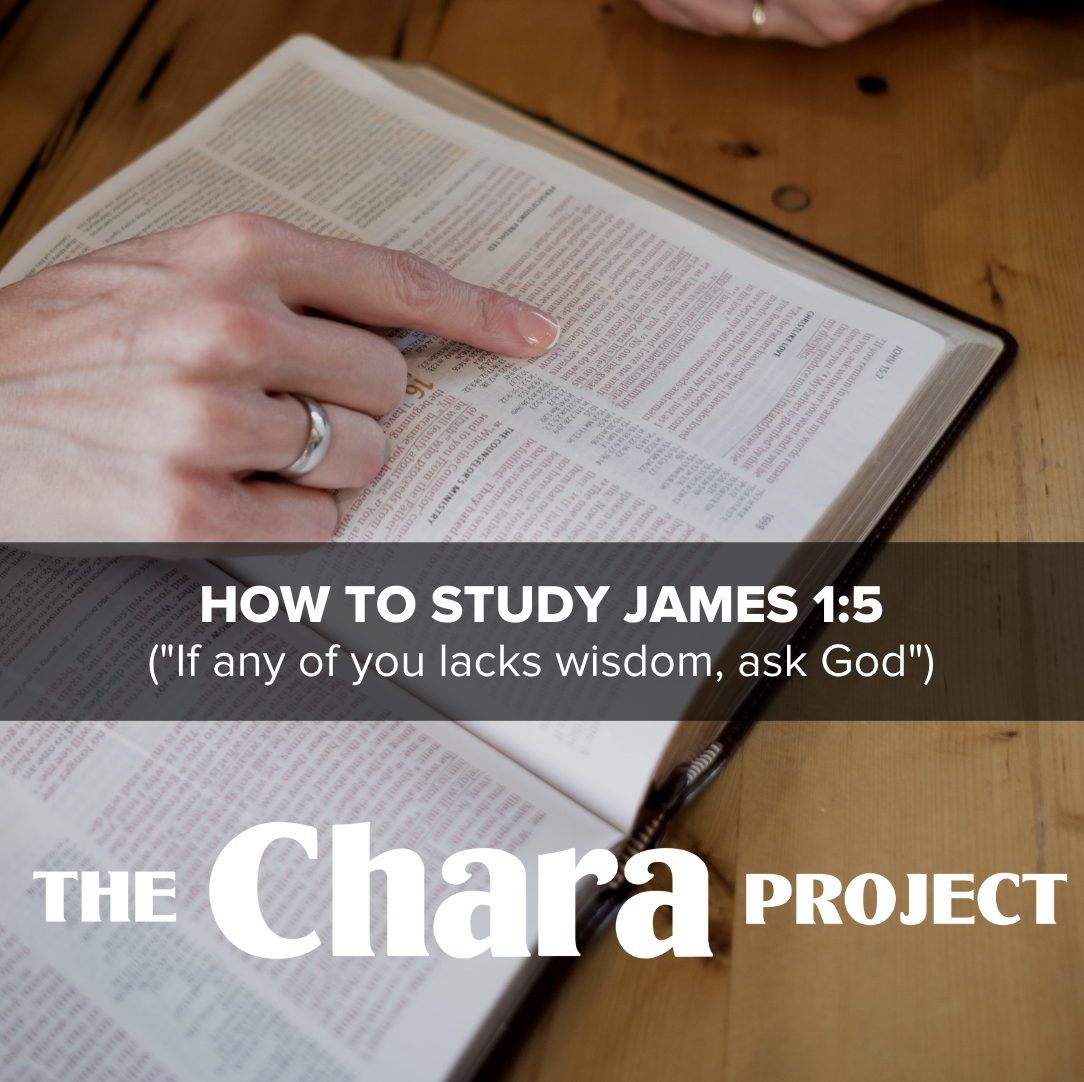Bible Study on James 1:5 ("If any of you lacks wisdom, ask God")
James 1:5
“Now if any of you lacks wisdom, he should ask God—who gives to all generously and ungrudgingly—and it will be given to him.” (CSB)
Welcome to the Bible Study Guide for James 1:5, which leverages questions from the CHARA Bible Study Guide when studying this verse. Below are the questions the Chara team chose to ask, in the order they chose to ask them, but feel free to use other questions or change up the order as you dive into this passage. For ANSWERS from the Chara team on these questions, check out the video below.
APPLY
Yield: What personal, cultural, or religious bias and assumptions do you bring to the text? For example, some people may see a verse like this and think when we go to God and ask Him for wisdom we get it. Or that if we don’t get wisdom from God when we ask for it, that something is our fault.
AUTHOR
Person: Who was the author? (Hint: check out James 1:1 for the answer and for more details on the author, look at the intro to the book of James in a Study Bible)
HISTORY
Who was it written to? When was it written? (Hint: check out James 1:2 for the audience. For insight on when the book was written, or more details on the audience, look at the intro to the book of James in a Study Bible)
CONTEXT
Immediate: What is the theme or main idea found in the surrounding paragraph(s). Read James 1:1-8. How does that help determine what the verse means?
RESEARCH
Observations & Questions: What observations or questions do you have when you reread the passage more than once? For example, you may wonder if we are to ask for wisdom during trials, what does that look like? What kind of wisdom? Are we not supposed to ever doubt?
Language: What does the word “wisdom” mean? Look it up in a standard dictionary to gain a deeper understanding of how the word “wisdom” is defined to be “applied experience, and knowledge.” How does that definition match how you thought of wisdom before looking it up in a dictionary?
Paraphrase: How would you rewrite the message of the passage into your own words, knowing now the definition of “wisdom”?
CONTEXT
Book/Bible: Our verses say to go to God with our request for wisdom. Does this idea hold true throughout the book of James and the rest of the Bible? What to we learn about where we get wisdom from based on other passages in the Bible? (Hint: look at cross references in your Bible to discover passages that speak to seeking wisdom or handling trials like James 5:13, Job 28:20, 23, Luke 11:9-13, or Colossians 1:9-12, James 3:13-18)
RESEARCH
Translations: Does another Bible translation (or version) add perspective or clarity on what the original language was trying to communicate in James 1:6 around doubt? (Hint: Check out the New Living Translation) How does this help us understand the definition of “doubt”?
CONTEXT
Book: Is the idea of “doubt” repeated throughout the book of James? (Hint: Read the full book of James or check out cross references that should lead you to passages like James 4:3-8) What does being “double-minded” mean?
Bible: Does my interpretation around doubt hold true throughout the rest of the Bible? What understanding does that give? (Hint: Use cross references or a concordance to find verses like Ephesians 4:14 and Matthew 13:1-23, paying close attention to verses 20-21).
HISTORY
How would the original audience have heard this message? Remember, the original audience was Jewish Christian believers that were likely under heavy trials, but anchored in God’s Word. They would have had the knowledge and understanding that would come if they asked God for wisdom. How does knowing this help you understand how they would have heard this message?
APPLY
Respond: What was expected of the original audience and what principles make sense for us now (is it a cultural or timeless truth)? Remember: a cultural truth is meant only for those people back then. A timeless truth is meant for all people across time… in this case, meant for Jesus’ followers back then and today. Hint: Given that James was writing to believers, if you are a believer, this passage applies to you. If you are a believer, what are some takeaways you have from this passage?
Yield: Based on the bias and assumptions you brought to the text, what do you need to surrender, if anything, to be in harmony with the Bible?
Pray: “Lord, what do you want me to learn and how should I apply this to my life?”
Join the Chara Project team as they study James 1:5 and see their ANSWERS to the questions asked from the CHARA Bible Study Guide.

